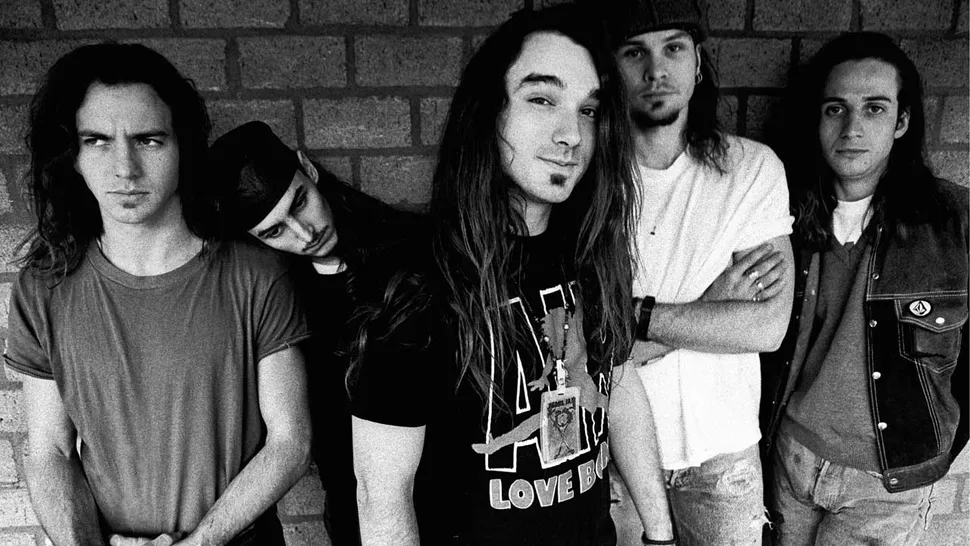
- From the perils of tragedy came one of rock music’s most auspicious debut albums
1990- Jeff Ament (bass) and Stone Gossard (guitar) were reeling after the death of their bandmate Andrew Wood, who was the lead vocals for Mother Love Bone. Gossard found acceptance in writing music and he and Ament found work with Mike McCready (guitar) and Matt Cameron as they worked on a series of demos. While they longed for a charismatic vocalist with the talent of Wood, they knew they would have to lower their expectations.
- Red Hot Chili Peppers with the Assist
Edward Louis Severson III rose up in the midwest. But after his parents divorce, ended up in San Diego. Eddie, the Petrol station security guard, avid surfer and pickup-basketball player was handed a demo from (former) drummer Jack Irons of RHCP after a game of hoops. Eddie, who later changed his last name to Vedder, listen to the demo from Gossard and Ament and immediately began writing some lyrics and singing over the tracks. One of those tracks, 'Dollar Short', was written by Vedder based on the fact that he learned the man who was his step-father wasn't his biological father, who had passed on. Fans would eventually come to know this track as 'Alive' and mostly misunderstand the meaning behind the lyrics- a gaping open wound dealing with family lies and lost identity. Eddie admits that over time, the fans have taken their interpretation and 'lifted the curse' changing the meaning to a celebrating chorus of 'I'm Still Alive'.
"Everybody writes about it like it's a life-affirmation thing -- I'm really glad about that," "It's a great interpretation. But 'Alive' is … it's torture, which is why it's f---ed up for me. Why I should probably learn how to sing another way. It would be easier. It's too much."
- From Demo to Opera
Vedder had the idea that the three songs on the demo told a story, much like a mini rock opera (which Eddie later rereferred to as the "Momma-Son" trilogy). And wanted to tie them all together - based on some things that happened to him (like 'Alive') and some things he imagined. So the next track he penned was 'Once'. A song about a son who couldn't deal with betrayal and became a serial killer and became the opening track of the album.
During the false start of the Master/Slave instrumental – which burbles away pointlessly for the opening forty seconds of Ten. Then a key turns in the ignition and Ten’s whip-crack opening salvo leaves the blocks, Vedder in character as a vengeful maniac with pedal to the floor and “sixteen-gauge buried under my clothes”. A song to make your neck bristle and your fists bunch, it announced Pearl Jam as a band to treasure, right out of the blocks.
While 'Once' outlined the story of a serial killer, the next track Eddie wrote lyrics to was 'Footsteps'. A track that ends with the eventual execution of the lead character of the rock opera who is looking back at his wasted life from a prison cell. Vedder said
"It's a modern way of dealing with a bad life, I'm just glad I became a songwriter."
The song never made the cut for the TEN album, but ended up on the B-side of the 'Jeremy' single.
- The Mookie Blaylock's Were Born
The recorded-over demo from Vedder made it's way back to Seattle and Gossard and Ament were blown away and flew Eddie up to Seattle for an audition. Within a week, he was part of the band. They added Dave Krusen (drums) and settled on the name in reference to NBA player, Mookie Blaylock and began opening shows for Alice in Chains. The band was clicking, the songs were rolling and they signed with Epic records and renamed the band Pearl Jam. The early years, the name was said to be an homage to Eddies great grandmother Pearl and her 'special' (peyote-laced) jam. But Vedder later said that was all bullshit, even though he did have a great grandma named Pearl.

- A Drummer- or Three
The band started recording in March of 91 at Seattle's London Bridge Studios. The name 'Ten' was the jersey number of the aforementioned Mookie Blaylock. They worked with Producer Rick Parashar, who Stone and Ament worked with on Temple of the Dog. After the recoding of the album, the band had to address drummer Dave Krusen who checked into rehab that May.
"It was a great experience. I felt from the beginning of that band that it was something special … They had to let me go. I couldn't stop drinking, and it was causing problems. They gave me many chances, but I couldn't get it together."
Enter Matt Chamberlain (Edie Brickell & New Bohemians) who filled in for a few shows, including one that was filmed for the 'Alive' video. But Chamberlain had prior commitments (SNL Band) and suggested Dave Abbruzzese - who toured with the band for 'Ten' and recoded Vs and Vitalogy. In 2017, when PJ was inducted into the R&R Hall of Fame, Abbruzzese was not included as an inductee.
- The Release - Pearl Jam is 'Alive'
Aug 27th, 1991 Epic released TEN and made 'Alive' the lead single. Ten was not an immediate success, but by late 1992 it had reached number two on the Billboard 200. The album produced three hit singles: 'Alive', 'Even Flow', and 'Jeremy'. Ten features a two-part track entitled 'Master/Slave' that both opens and closes the album. The first part begins the album, before 'Once' starts, and the second part closes the album, after 'Release'
- Evenflow Gains Traction but Jeremy Launches
By Spring of 1992, the album was gaining traction and that was based on 'Even Flow' - a track that was a staple of their live shows but caused the most trouble in the studio. All the members agreed that is was a nightmare of a recording.
There were a hundred takes of that song and we just never nailed it.
But it would climb to #3, helped by the concert-based video that showcased an erratic, stage-climbing, stage-diving Vedder. Evenflow would go on to be the song the band has played the most times live. And while the album version clocks in at 4:53, the live version is a different animal and can go as long as Mick McCready wants to draw out his Hendrix-ish solos.
At the recent LA show, Eddie said this song was written about a homeless vet, also named Eddie, that hung around the warehouse PJ rehearsed at. Something he has never opened up about until 2018. That he would always buy sandwiches for them to eat and chat. When he'd come home from tours, he would always be on the lookout for Eddie. And one day, he disappeared. Later, learning that he had passed away. But Ed said that he never told Eddie he wrote the song about him.
Also, there is the alternate ending, that was played heavily on US radio stations
An alternate version was released as a UK single and is different than the album version. Eddie Vedder yells "Ha!" to start the song, and at the end, says, "I died, I died and you just stood there. I died and you watched me. I died and you walked by and said, 'No, I'm dead.'"
And then came 'Jeremy'. A song inspired by a school shooting - Texas teenager Jeremy Wade Delle shot himself in front of his classmates. From Vedder:
"It came from a small paragraph in a paper which means you kill yourself and you make a big old sacrifice and try to get your revenge. That all you're gonna end up with is a paragraph in a newspaper. Sixty-four degrees and cloudy in a suburban neighborhood. That's the beginning of the video and that's the same thing in the end; it does nothing … nothing changes. The world goes on and you're gone. The best revenge is to live on and prove yourself. Be stronger than those people. And then you can come back."
Up until Jeremy, the group had opted only to record live music videos. Jeremy was directed by Mark Pellington and told the powerful story. MTV later censored parts of the video and again in 1999 after the Columbine shooting. While PJ was pleased with the video, they decided they didn't want fans to remember the songs as videos, and following a candid camera footage of 'Oceans' the band would go three albums (6 years) without making another video- until 1998, 'Do the Evolution'
*Edit- looks like Youtube has censored this as well
- I Know Someday You'll Have a Beautiful Life
Hands down, I feel 'Black' is PJ's best work. One of rock music’s melancholiest tracks. Epic wanted to release 'Black' as a single, but the band wouldn't allow it. Expressing the belief that the song was 'fragile' and wasn't written to be a hit. Despite not being released as a single, radio stations flooded the airwaves and it instantly became a hit.
It's about first relationships. The song is about letting go. It's very rare for a relationship to withstand the Earth's gravitational pull and where it's going to take people and how they're going to grow. I've heard it said that you can't really have a true love unless it was a love unrequited. It's a harsh one, because then your truest one is the one you can't have forever.
- The Ending
The album wraps with one of my favorite PJ songs, 'Release'. Another song where the band was creating the music and Eddie just started singing lyrics. The original was said to exceed ten minutes, but was cut down to the album length. The story goes, this was Vedder's letter to his father, who he never met. A beautiful song that has heavy emotion about living with loss.
- The Accolades
Ten would go on to be defined as "arguably the greatest rock debut record of all time". It's in a number of different publications as being ranked in the top 100 albums of all time (as low as 42nd). It produced three hit singles, not counting 'Black' which reached number three. 'Alive' and 'Jeremy' were nominated for video music awards and 'Jeremy' went on to win 4 including Video of the Year and Best Group Video. 'Jeremy' was also nominated for Best Rock Song and Best Rock Performance for the 1993 Grammy Awards.
It's 52 minutes and 20 seconds of pure bliss. No fillers. All bangers. And I can tell you, for 30 years I have overplayed this album from start to finish more times than I can count.



